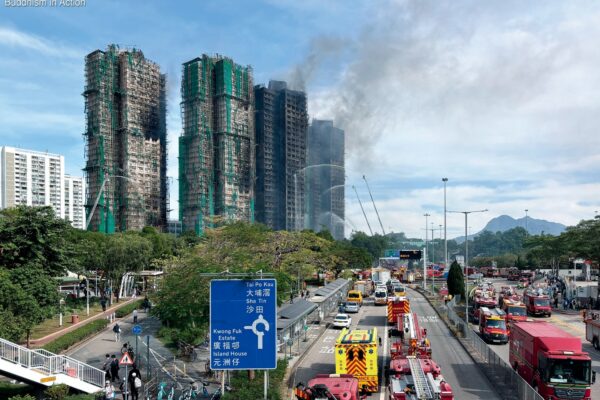By Yeh Tzu-hao
Abridged and translated by Wu Hsiao-ting
As Taiwan grappled with the aftermath of the April 3 earthquake, Tzu Chi brought solace and aid to those reeling from the disaster’s impact.
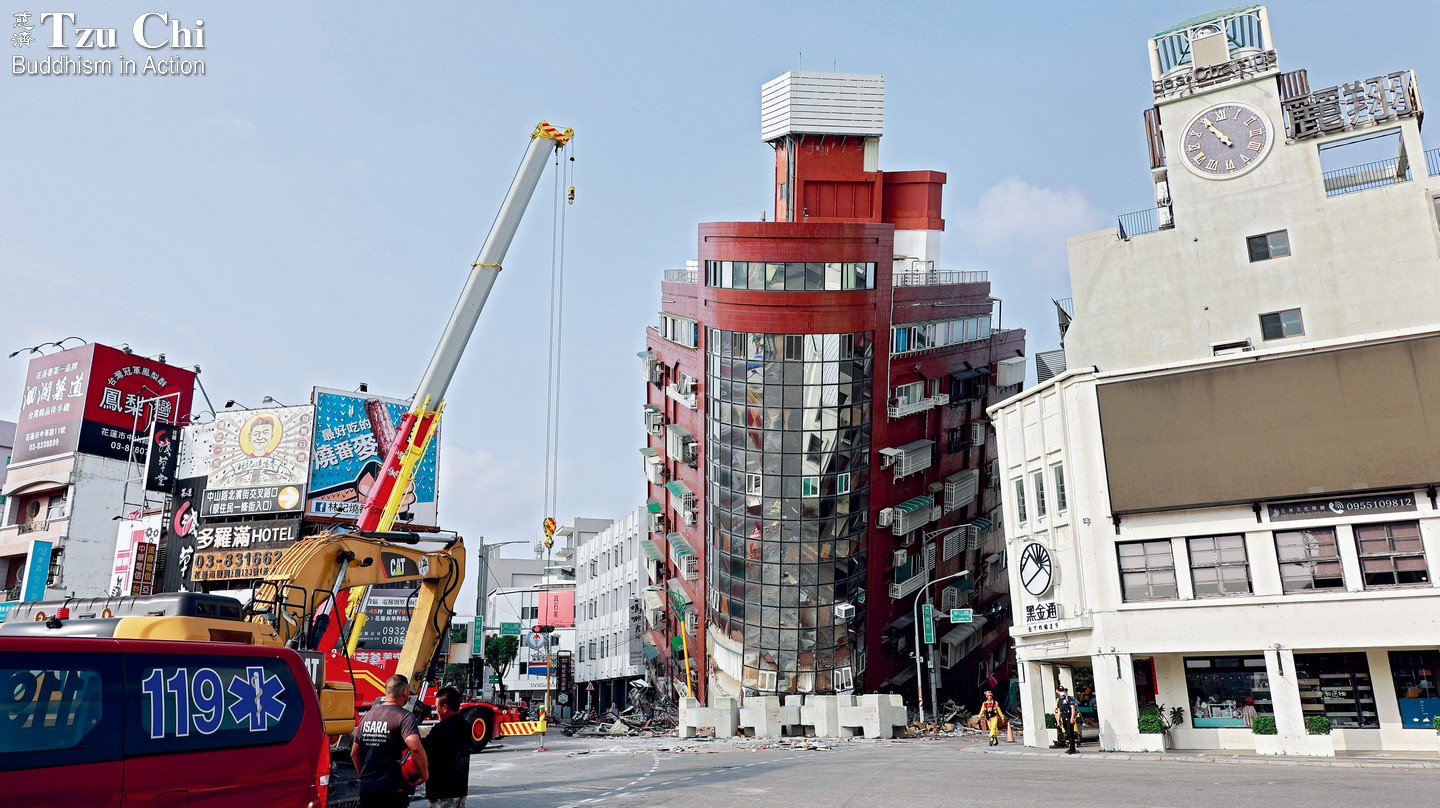
The Uranus Building in Hualien City, Hualien County, partially collapsed during an earthquake that hit Taiwan on April 3, prompting the deployment of search and rescue workers.
Luo Ming-dao
On the morning of April 3, Taiwan was rocked by a formidable magnitude 7.2 earthquake. Eastern Hualien County, located near the epicenter, bore the brunt of the impact. Some buildings partially collapsed or were rendered uninhabitable. Taroko National Park, a popular tourist destination, suffered devastation from landslides and rockfalls. In response, the authorities acted swiftly, mobilizing search and rescue teams to aid affected areas.
In the immediate aftermath, the Tzu Chi Foundation set up operations at the Hualien County Government Disaster Response Center, the only civilian organization to do so. Deploying manpower and resources, Tzu Chi worked with the authorities and other NGOs, providing comprehensive support to affected residents and assisting in frontline rescue efforts.
Aiding in airlift operations
Household items in numerous buildings across northern Hualien were toppled or strewn about during the intense shaking of the earthquake. Residents also fell as they sought refuge. Over 1,100 injuries were recorded across Taiwan. Among the injured was Mayor Wei Jia-yan (魏嘉彥) of Hualien City, the county seat. “A wardrobe fell and hit my foot,” recounted the mayor, “luckily no bones were broken.” Using a crutch due to his injured left foot, he vividly showed the quake’s impact as he oversaw relief operations in the aftermath.
“Some quake victims required surgery or hospitalization,” said Tzu Chi volunteer Li Si-bei (李思蓓), who works at Hualien Tzu Chi Hospital. “I enlisted fellow volunteers to provide support for them, bringing the love of Master Cheng Yen and volunteers from around the world.” Li herself was affected by the temblor, but after instructing her two daughters to tidy up the fallen items at home, she quickly made her way to the hospital to assist injured patients.
Li vividly remembered the arrival of the first eight patients at the hospital, among them a woman named Chen. Ms. Chen had been preparing to deliver vegetables she had grown herself to a friend when the earthquake struck. She suffered a fractured hip bone when she was caught under a fallen cabinet at her front door. “Unable to wait for an ambulance,” Li said, “Ms. Chen hailed a taxi to the hospital. She was in such pain when she arrived that she couldn’t even put weight on her feet; an emergency room physician had to carry her in.”
Landslides in Taroko National Park blocked roads and left hundreds of people stranded in mountainous regions. With vehicles unable to navigate through the terrain, helicopters were used for transporting people and supplies. The Hualien County Police Department reached out to the Ministry of the Interior’s National Airborne Service Corps for assistance and also sought support from Tzu Chi to provide relief supplies.
“We have never been involved in helicopter airlifts before,” remarked Tzu Chi volunteer Xu Zhi-xian (許志賢), a retired police officer. “This is the first time we’ve encountered such a situation.” As a cadre member of the Hualien chapter of the Tzu Chi Association of Police, Firefighters, and Their Families, Xu maintains regular communication with local law enforcement and firefighters. He helped organize the response after Tzu Chi was requested to provide relief supplies. At 6 a.m. on April 5, equipped with essential supplies, a team of Tzu Chi representatives, led by Dharma Master De Mai (德勱) from the Jing Si Abode and accompanied by the police, set off in three police cars and one truck, heading towards the Taroko helicopter landing pad.
“The first helicopter mission transported nine stranded individuals from Tianxiang [in Taroko National Park],” said Xu, who was part of the Tzu Chi team. “Among them were tourists from Singapore and Hong Kong. They were deeply touched to see Master De Mai and our volunteers offering care on-site. Some were moved to tears.” Xu noted that over 600 people were trapped in the Taroko area after the earthquake, including tourists, hotel staff, and personnel from the Tianxiang Police Station and the Seventh Special Police Corps, all in need of food, water, and other supplies. The collaboration between Tzu Chi, the Hualien County Police Department, and the Airborne Service Corps facilitated two rounds of airlifts, providing crucial aid until roads were cleared.
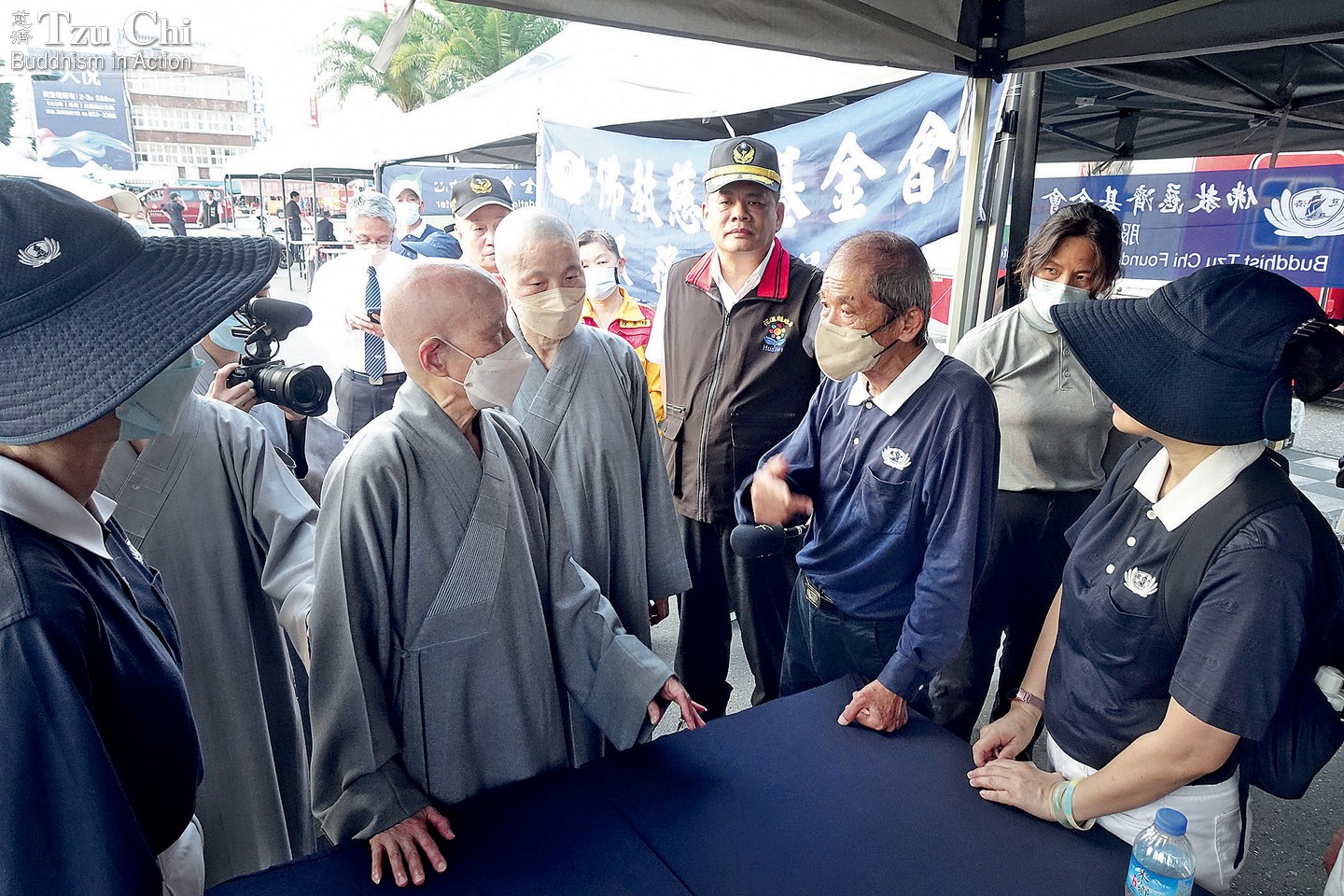
On the afternoon of April 3, Dharma Master Cheng Yen arrived at the site of the collapsed Uranus Building, where she expressed care for the on-site volunteers and rescue workers.
Courtesy of Tzu Chi Hualien headquarters
Partnerships in action
According to data from the Hualien County Government, the earthquake caused 77 buildings in the county to collapse or become hazardous, affecting over 1,700 households. In response, the county government and township offices established temporary shelters at eight locations, including Huaren Junior High School and Zhonghua Elementary School. Tzu Chi also contributed to the relief efforts.
Lu Hsueh-cheng (呂學正), director of the Comprehensive Planning Office at Tzu Chi’s Department of Charity Mission Development, remarked, “Compared to the February 6 earthquake six years ago, the government’s response this time was so swift it was beyond my imagination. When I arrived at Huaren Junior High School around ten o’clock that morning, personnel from the Ji’an Township Office had already prepared the shelter equipment. The staff was also in place.” He noted that Tzu Chi had strengthened its collaboration with the public sector in this regard over the past two years. For example, they partnered with the Ji’an Township Office last year for disaster response and shelter exercises. Various signage prepared during those exercises proved useful during this crisis too.
Huaren Junior High School played a crucial role in Ji’an Township’s response to the earthquake. Red Cross-provided tents were erected across the playground, while the multifunctional gymnasium, constructed by Tzu Chi for the school seven years ago, offered shelter space equipped with privacy cubicles, folding beds, and blankets—all provided by Tzu Chi—ensuring the comfort and privacy of displaced residents.
To alleviate post-disaster inconveniences, government agencies and civil organizations dispatched personnel to aid displaced quake victims. At the shelter set up in Zhonghua Elementary School, for example, staff from the National Health Insurance Administration facilitated the reissuance of national health insurance cards for those who fled without them. A telecommunications company installed phones for evacuees to make free local calls, real estate agents coordinated rental matching services, and the military erected field shower tents in a corner of the playground. “Twelve people at most are allowed to shower at one time, with two daily time slots available—one for men and the other for women,” said the responsible officer.
With the generous support of people from all walks of life, the shelters established after the earthquake were well-stocked with essentials. However, despite this touching assistance and regardless of how well-equipped a shelter may be, nothing could replace the comfort of one’s own home. “There was an elderly man who said he had lost everything and felt utterly despondent,” Mayor Wei Jia-yan said. “Our social workers and other colleagues made continuous efforts to uplift his spirits.” Speaking of this, the mayor extended special thanks to Professor Gu from Dong Hwa University in Hualien for organizing transportation to take affected residents, including the elderly man, to the university campus in the hope that the beautiful surroundings would provide some comfort.
Empathizing with the plight of quake victims, Tzu Chi enlisted seasoned senior volunteers to work alongside professional social workers and contracted psychologists from health agencies to provide care in shelters. “Our senior volunteers have amassed a wealth of life experience. Drawing from their rich life experiences and guided by Master Cheng Yen’s teachings, they are able to provide meaningful emotional support to survivors of the earthquake,” remarked Huang Yu-qi (黃玉琪) from the Disaster Reduction and Prevention Section, Comprehensive Planning Office, the Tzu Chi Department of Charity Mission Development. Huang further explained that the volunteers who offered care in shelters had all undergone relevant training, and so they knew how to provide support without causing further harm. The professional psychologists were thus happy to work with them.
Emergency cash distribution
After the earthquake, Tzu Chi provided emergency cash to over 1,400 families in Hualien and northern Taiwan who were forced to evacuate due to damaged homes. Each household received 20,000 to 50,000 New Taiwan dollars (US$670 to 1,670), depending on family size and the severity of the damage to their homes.
The distribution of emergency cash was carefully planned. Volunteer Wang Xuan-fang (王宣方) from Taipei described the process: quake victims first received assistance with paperwork and received cash and gifts at a designated area staffed by volunteers and social workers. Then, they were directed to another area where additional volunteers and nuns from the Jing Si Abode provided comfort and listened to anyone willing to express their emotions.
Lai, one of the cash aid recipients, expressed her concerns. Her home suffered severe damage in the quake, and the shop where she worked closed due to slow business, leaving her temporarily unemployed yet obligated to continue making mortgage payments. She also worried about the difficulty of finding suitable rental housing, given the high demand from other quake victims seeking rentals. “For everyone, finding a place to settle down is the top priority; housing is the most urgent matter,” she said.
In contrast, another recipient, Hu, who secured housing early, appeared much calmer. Her apartment, located on the fifth floor of a building, sustained minimal damage, but the building itself was deemed unsafe for habitation. To ensure that her mother, who was battling cancer, and her school-going children could maintain a sense of normalcy, she and her husband promptly began searching for a new home. Fortunately, they found a compassionate landlord willing to provide a short-term lease for three months.
“I believed someone would come to help us,” Hu remarked, “and that we just needed to wait and take good care of ourselves first.” She works at a tutoring center, while her husband is a baker at a supermarket. Both continued working after the quake, with her husband even baking cookies to share with fellow victims. Hu expressed gratitude for the care provided by Tzu Chi and remained hopeful about their situation. “We’ll be back on our feet,” she affirmed. “We just need some time.”
The morning after the earthquake, volunteers conducted Tzu Chi’s first emergency cash distribution at Dongjing Temple, near the Uranus Building.
Liu Qiu-ling
Tzu Chi held five large-scale distributions of emergency cash after the temblor, with nuns from the Jing Si Abode and volunteers on-site listening to survivors’ accounts of their distress.
Qiu Jun-cheng
Young people contributing
Students and faculty from Tzu Chi University and the Tzu Chi University of Science and Technology, both in Hualien, along with members of the Tzu Chi Collegiate Association in eastern Taiwan, came forward to help survivors in the aftermath of the earthquake too. For example, over 30 students from Tzu Chi University, guided by their teachers, volunteered at Zhonghua Elementary School, Huaren Junior High School, and Hualien Baseball Stadium.
“There was a lot of work to do,” noted Yang Jing-yong (楊景湧), a graduate student in the Physical Therapy Department at Tzu Chi University, “from erecting tents, to setting up beds, to preparing items for survivors. We came together and combined our strength to ensure everything ran smoothly.” Hailing from Indonesia, Yang felt significant fear during the earthquake, as such events are rare in his hometown. However, he enthusiastically volunteered in the aftermath, dedicating the four-day weekend following the quake (due to Tomb-Sweeping Festival and Children’s Day) to relief efforts.
On a rainy day, Yang escorted a quake victim to a parking lot, holding an umbrella. “The home we worked so hard to buy was gone in an instant,” lamented the victim, evoking deep empathy in Yang. “Without your help, we’d be lost. We’re so grateful to you all.” Yang was profoundly touched. “In that moment, I truly felt my value as a human being,” he said with emotion.
Lin Shi-feng (林世峰), a Traditional Chinese Medicine student at Tzu Chi University, also volunteered after the quake. Reflecting on his experience, he said: “When the quake struck in the morning, I was shocked and disoriented, but by afternoon, I was volunteering, offering comfort to others while finding solace in the process.” He appreciated the valuable experience of transitioning from a victim to a volunteer, overcoming shock by contributing to others’ well-being.
Disaster reduction
To minimize the impact of disasters, it’s crucial to conduct regular drills and training during normal times. For a place like Taiwan, prone to natural disasters such as earthquakes and typhoons, preparedness is paramount. After the 2018 Hualien earthquake, the Tzu Chi Foundation and the Hualien County Government signed a memorandum of cooperation to strengthen disaster reduction and relief capabilities. Similar agreements were made with Hualien City and the townships of Xincheng, Xiulin, and Ji’an. As a result, many civil servants in Hualien County responsible for related tasks have attended evacuation and shelter training courses organized by Tzu Chi. Some have even participated in a training program co-organized by the county fire department and Tzu Chi and earned disaster management certificates recognized by the Ministry of the Interior.
Xiao Zi-wei (蕭子蔚), head of the Social and Labor Division of Hualien City Government, said: “We’ve even conducted training for members of community development associations. Having gained hands-on experience, everyone was better prepared this time.”
Another noteworthy observation from the recent earthquake is the commendable performance of the six schools in northern Hualien that were part of Tzu Chi’s Project Disaster Reduction. This project was launched to construct new buildings to replace aged or damaged structures in schools in Taiwan. The robustness of the buildings constructed by Tzu Chi at the six schools underscores the foundation’s commitment to disaster reduction efforts.
Lin Min-chao (林敏朝), a consultant for Tzu Chi’s Construction Department, cited the multifunctional gymnasium built by Tzu Chi for Huaren Junior High School as an example. “In general, the safety factor for such buildings is 1.2 times that of other school buildings, but those constructed by Tzu Chi are even higher, reaching 1.7 times.” To enhance natural lighting, the gymnasium’s glass window area was increased. Nevertheless, due to the use of a steel frame structure and lightweight roofing and walls, the seismic resistance remains strong.
“Our goal with the school buildings we construct isn’t just to withstand strong earthquakes but also to serve as evacuation shelters for residents,” Lin asserted.
Nuns from the Jing Si Abode are pictured in the photo visiting evacuees at a shelter on the evening of the earthquake.
Chen Rong-qin
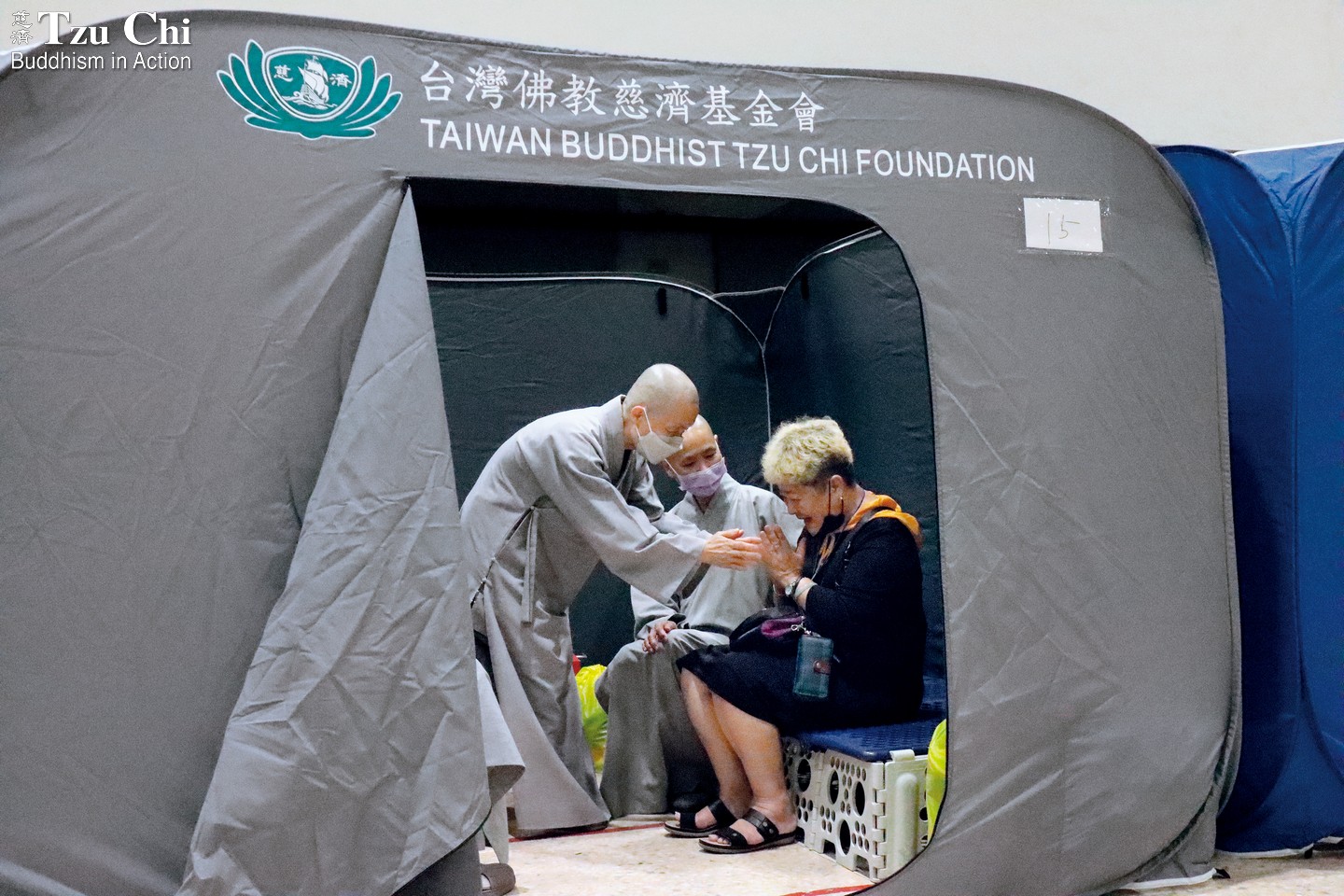
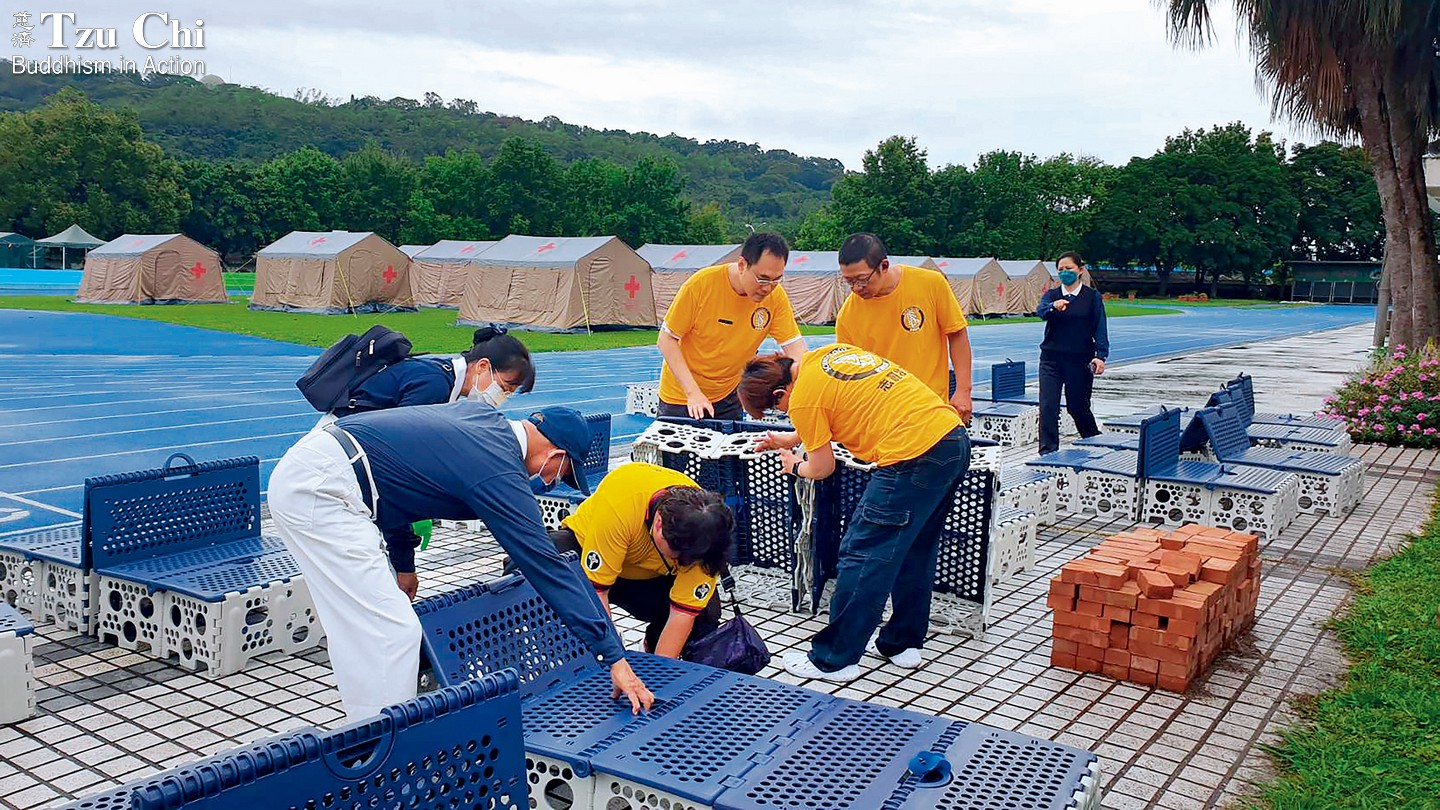
Tzu Chi volunteers work with personnel from a non-governmental organization to clear folding beds from a shelter about to close.
Huang Yu-qi
Distributing emergency cash to affected households, visiting hospitals to comfort the injured, chanting the Buddha’s name for the deceased at funeral homes, and providing relief supplies… After completing the initial phase of emergency relief efforts following the earthquake, which included the tasks mentioned above, Tzu Chi began another phase to aid in rebuilding. In mid-April, discussions were held with the Hualien County Government and the TSMC Charity Foundation to plan reconstruction efforts. Tzu Chi took on the responsibility of repairing homes in the townships of Xincheng, Xiulin, and Ji’an, prioritizing repairs for the homes of vulnerable residents. Expert volunteers from across Taiwan started surveys and repair work on April 18. Tzu Chi volunteers worldwide are also assisting by raising funds to help quake victims rebuild their lives.

 Zoom in picture)
Zoom in picture)
